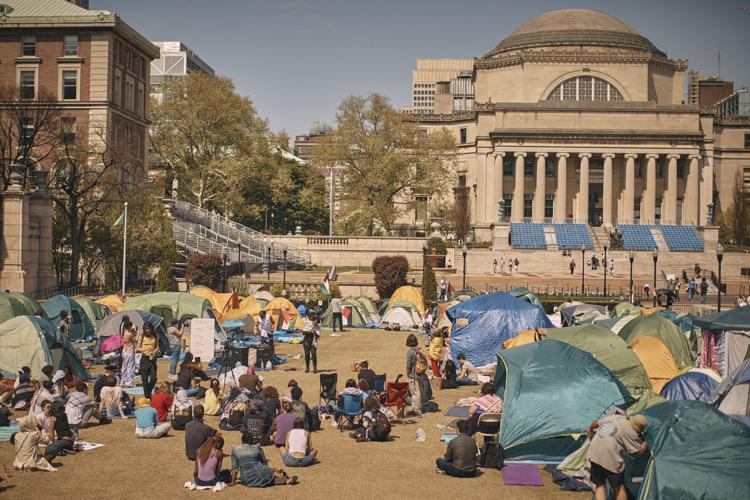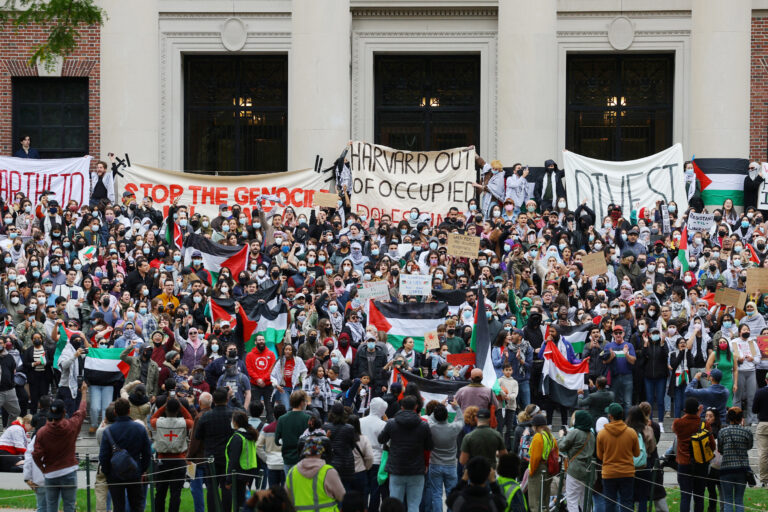Universities struggle with how to regulate free speech and other rules

Pro-palestinian protests at American universities are escalating. In the early hours of April 30th more than 200 demonstrators at Columbia University barricaded Hamilton Hall, a building famously occupied by anti-war protesters in 1968. At the University of California, Los Angeles, scuffles erupted this week between pro-Israel and pro-Palestinian students. Police have arrested students in recent days at Virginia Tech, the University of Florida, Tulane University and elsewhere. The total number of campus arrests is now near 1,000, yet tented encampments—the signature motif of pro-Palestinian campus demonstrators—continue to bloom like spring flowers from coast to coast.

The blame game is also intensifying. University leaders are again in the firing line, accused by some of having brought the chaos on themselves by coddling student trespassers and allowing antisemitic speech to go unpunished. On April 29th 21 Democrats in the House of Representatives signed a letter to Columbia’s board demanding that it “act decisively” to disband the protest encampment there, arguing that its presence violated federal civil-rights law by creating an “impermissibly hostile and unsafe environment for Jewish students”. Yet teachers at Columbia and elsewhere are castigating their administrators for turning to the police. Student protests, they argue, should be handled as a teachable moment via negotiations and campus discourse.

The Gaza protests have exposed three fault lines in American university governance. First, the demonstrations have destroyed an already tenuous compact governing free speech on campus. Second, they have made plain that the tools universities possess to enforce campus requirements are limited and often counter-productive when, predictably, students make a mockery of the rules. Finally, the protests have revealed university leaders to be no better than C-plus students when challenged by a nuanced case study familiar from political-theory syllabuses: when does collective security trump individual rights?
The most important problem is speech regulation. Rules at private universities are not as permissive as the First Amendment, for good reason. In America, constitutionally protected speech can be hateful, false, outrageous or all of these—just about anything goes, short of targeted incitement to violence. Such a free-for-all can’t be permitted in a classroom, just as it is not tolerated in workplaces. Yet for pedagogical and ideological reasons, private universities prioritise free speech much more liberally than a typical workplace would.
Through trial-and-error university leaders in recent years have forged workable “time, place and manner” rules to regulate robust demonstrations and lectures by unpopular speakers. Yet they have struggled with the problem of targeted hate speech and they were plainly unprepared for what the polarising war in Gaza has provoked. A chant like “Globalise the intifada!” might be protected by the First Amendment but is understandably unacceptable to the thousands of Jewish students enrolled at Columbia.
Badgered by politicians for not doing enough, and cautioned by faculty against intervening ham-handedly, university presidents have often fallen back on the blandest of formulations. Brown University, wrote Christine Paxson, its president, in a letter sent this week to student protesters, “has a long-established history of recognising protest as a powerful form of expression. But protest cannot violate university policies that are intended to ensure the safety and security of members of the Brown community.”
Dr Paxson is attempting one salutary approach: she is negotiating with protesters in the hope that she can persuade them to voluntarily dismantle their encampment in exchange for a commitment to talk further about the students’ demands for divestment of university endowment funds from companies that support Israel or make armaments. On Monday, Northwestern University, outside Chicago, announced a similar deal with demonstrators there, one intended to allow protests to continue while exams and graduation ceremonies also go forward.
Yet such negotiations don’t always work. What then? Minouche Shafik, Columbia University’s president, asked the police to clear a pro-Palestinian protest encampment on April 18th, resulting in the arrests of more than 100 students. New tents immediately popped up nearby. Dr Shafik, facing a backlash, then opened talks with student demonstrators. When those negotiations foundered, she set a deadline of 2pm on April 29th for encamped students to disperse. The university announced that it would suspend those who stayed put, potentially depriving them of university housing and the prospect of a degree. After dark, the protesters seized Hamilton Hall.
There may yet be room for a negotiated solution at Columbia that allows Jewish students to feel safe, exams to take place, graduation to go on and the police to stay away. Yet it is far from obvious what that solution might be. “We’re not moving until our demands are met,” said Suebla Polat, a student organiser. “The students have always been open to negotiations [but] we were clear about our demands.”
Despite high iron gates, village-inspired layouts and uniformed campus security officers, America’s universities are not sovereign. City and state police don’t ask permission to barge in if, say, a murder has occurred. But the offence that students camped in tents on campuses are committing is, at worst, misdemeanour trespass, an infraction big-city police departments often ignore. As a practical matter, in the days and weeks to come, university leaders will often have to decide whether or when to call the cops. In another season, they might be in no great hurry to disperse peaceful demonstrators, but stage-builders are already on many campuses to prepare for graduation ceremonies, a lavish and emotional tradition of the American university calendar. At many universities with pro-Palestinian encampments, something will have to give.
Columbia’s lesson to date is that police force backfires. It also erodes a university’s values-driven compact of free inquiry, learning and service. Yet intransigent demonstrators and mounting pressure from politicians may leave Dr Shafik and many of her counterparts across the country with little choice. ■
courtesy: The Economist



COMMENTS